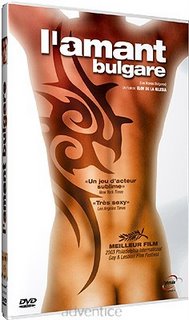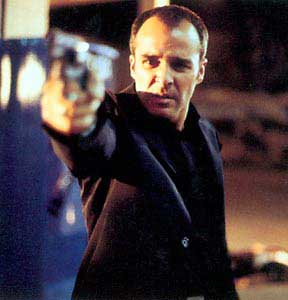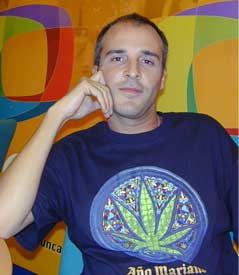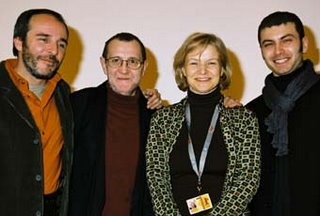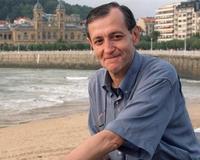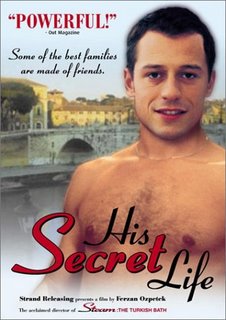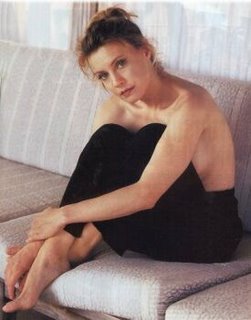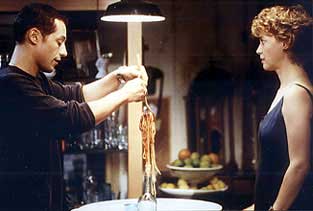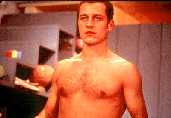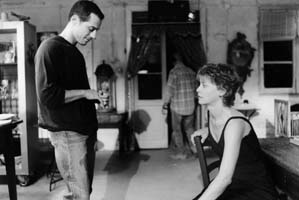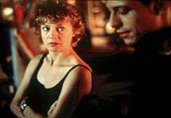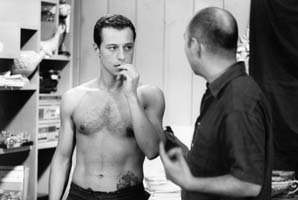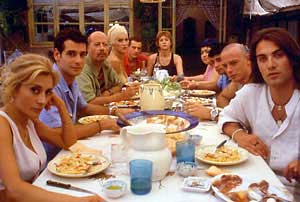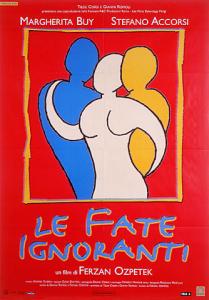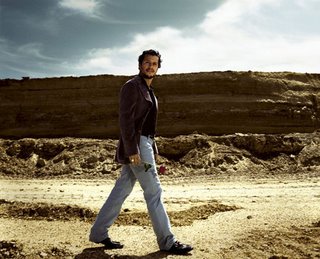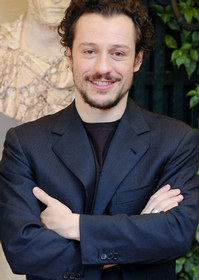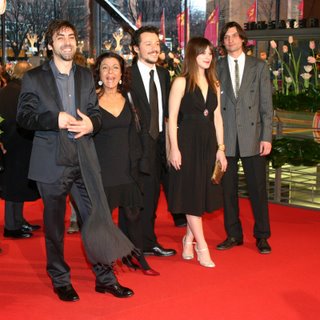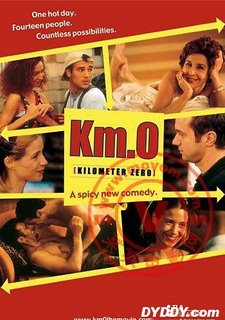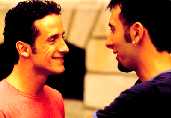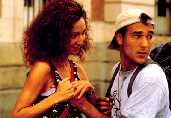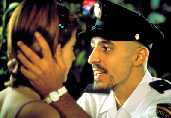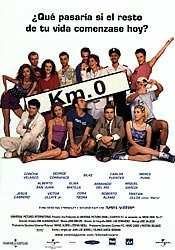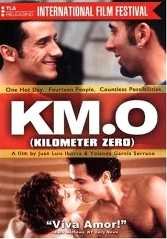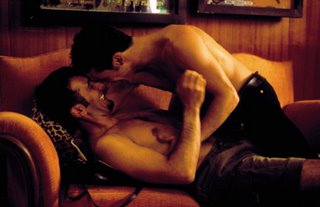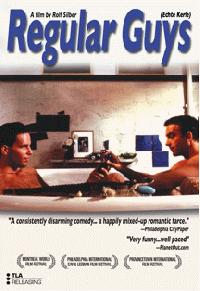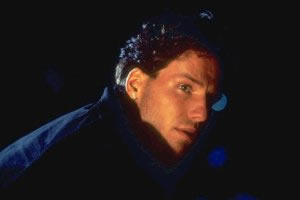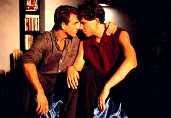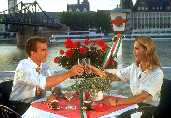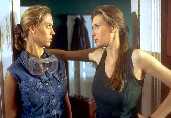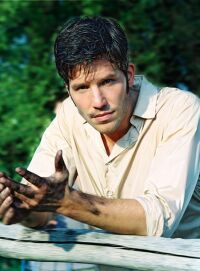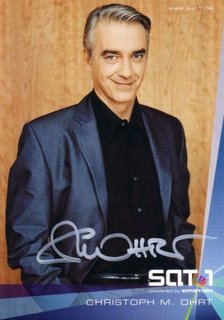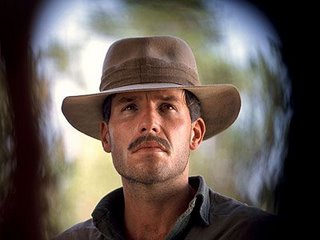Bulgarian Lovers
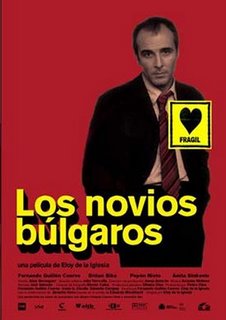
Bulgarian Lovers (Los Novios Bulgaros)
(2003)
Directed by: Eloy de la Iglesia
Writer: Eduardo Mendicutti
Genre: Comedy
Synopsis:
There is something really seedy and despicable about the way people manipulate each other in Bulgarian Lovers, the new film by Eloy de la Iglesia, who has a penchant for shocking viewers. He disappeared for a while due to personal problems, but returns with the adaptation of Eduardo Mendicutti's novel. Bulgarian Lovers is difficult to watch both because of a strong desire to strangle the lead characters and because of problematic plotting. The former is supposed to evoke strong emotions, the latter is an unintentional result. So this film has the odd distinction of annoying people, both because it wants to and because at times it's not much of a movie.
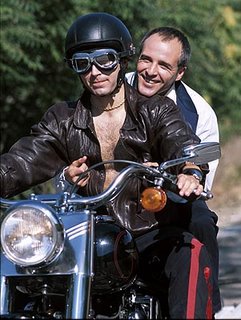
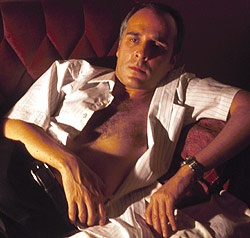
Daniel (Fernando Guillen Cuervo, Talk to Her, Don Quixote, Knight Errant) is a businessman. He and his friends prowl gay bars looking for young impressionable men. They are rich, and these young men, especially the immigrants, tend to be poor. It's easy to find a lover and ply him with money and food for sex. On one of these escapades, Daniel meets Kyril (Dritan Biba), a Bulgarian immigrant. Apparently, Bulgarians have a reputation for being really hot, so Daniel quickly latches onto him. Kyril has a girlfriend in Germany, and lies to her about his relationship with Daniel.
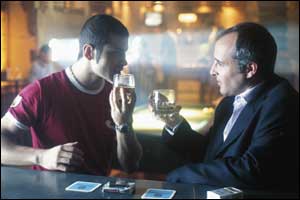
Daniel is using Kyril for easy companionship, and his affection soon turns to obsession. Because of this, Daniel is more and more of a wimp to Kyril's actions. He is using Daniel for money, and has something really shady going on. Daniel is curious, but not enough to do anything about it. Even when it becomes pretty certain that Kyril is doing something illegal, and when he returns injured, Daniel still does nothing. The arrival of Kyril's girlfriend Kalina (Anita Sinkovic) worsens things. Kyril is lying to her about Daniel and what he does, and Daniel is feeling more resentful and jealous.
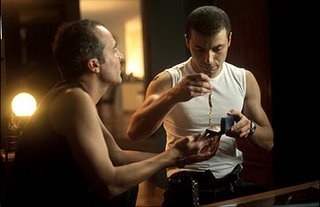
Kyril is like a drug for Daniel. He is turned on by the danger, even though he knows it is bad for him. An attempt to break up with Kyril ends quickly, and Kyril always seems to win their fights. The interesting thing about these two people is that they know they are using each other, and don't seem to mind that much. For Daniel, it's more frustrating. It's obvious that things are not going well for him, but he keeps going to Kyril.
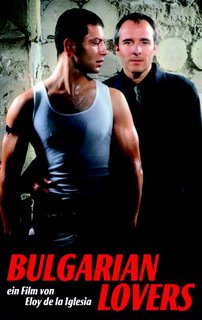
Cast:
Fernando Guillen Cuervo .... Daniel
Dritan Biba .... Kyril
Pepin Nieto .... Gildo
Roger Pera .... Lawyer
Anita Sinkovic .... Kalina
Fernando Albizu .... Mogambo
Roman Lukn·r .... Simeon
Simon Andreu .... Daniel's Father
Julia MartÌnez .... Daniel's Mother
Gracia Olayo .... Rosita
Emma Penella .... Remedios
Aure Sanchez .... Bambi
Alberto Lozano .... Taxista
”scar Iniesta .... Emil
Isabel Ampudia .... Hermana 1
Also Known As: Los Novios Bulgaros
Runtime: Germany:101 min (Berlin Film Festival) / USA:101 min
Country: Spain
Language: Spanish / Bulgarian / English
Color: Color
Sound Mix: Dolby Digital
Reviews
Esta película es por sí sola (por el mero hecho de existir) todo un acontecimiento, pues supone el regreso al cine después de quince años (su úl-tima obra cinematográfica fue “La estanquera de Vallecas” en 1987, aunque ya en el 2001 grabó para televisión la puesta en escena de la pieza teatral “Calígula”) de uno de los hijos más bastar-dos que ha dado este séptimo arte, el vasco Eloy de la Iglesia. Su retiro forzoso de la gran panta-lla por su conocida adicción a las drogas, parece haber sido definitivamente dejado atrás y no cabe duda que con “Los novios búlgaros” Eloy ha vuelto con toda su fuerza, rodando el film que le ha venido en gana como le ha venido en gana, y aunque el resultado no cabría calificarlo objetivamente de bueno, sí que por varios motivos se hace absolutamente necesario en nuestros días, a pesar de su obligada etiqueta de rara avis.
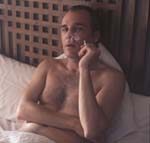
Con esta inocentada en forma de película, Eloy de la Iglesia recupera sin ru-bor y de forma muy provocadora y alocada todo el cine homosexual, gamberro, de drogas y de denuncia, de la época de la movida madrileña y sobre todo de lo que toca a su propia filmografía.
 De esta manera se desmarca por completo de la actual corriente de cine políticamente correcto, higiénico y falto de vida, que amenaza con asfixiar nuestra cinematografía autóctona (aunque el caso de España no esté aislado en el mundo) e insufla al celuloide de una carga explo-siva de personalidad y mala leche, que sin llegar a ocultar algunas de sus ca-rencias como narrador cinematográfico (que siempre ha esgrimido), sabe sacar el máximo provecho de sus aciertos y sus virtudes, llegando a colarnos esta clara exaltación de la serie B como una obra de autor de serie A (algo similar a lo ocurrido con la infame “The Rocky Horror Picture Show”, con la que guarda bastantes similitudes).
De esta manera se desmarca por completo de la actual corriente de cine políticamente correcto, higiénico y falto de vida, que amenaza con asfixiar nuestra cinematografía autóctona (aunque el caso de España no esté aislado en el mundo) e insufla al celuloide de una carga explo-siva de personalidad y mala leche, que sin llegar a ocultar algunas de sus ca-rencias como narrador cinematográfico (que siempre ha esgrimido), sabe sacar el máximo provecho de sus aciertos y sus virtudes, llegando a colarnos esta clara exaltación de la serie B como una obra de autor de serie A (algo similar a lo ocurrido con la infame “The Rocky Horror Picture Show”, con la que guarda bastantes similitudes).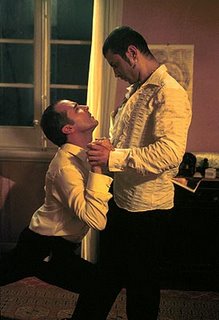
No consigue sacar De la Iglesia a su cinta de los abismos de los muchos excesos, obviedades y lugares comunes que la recorren (principalmen-te en todo lo referente a su trama de narcotráfico que no se aguanta ni queriendo ser magnánimo, pero también, aunque de forma mucho más bus-cada, en todo su reflejo de la fauna homosexual madrileña), pero aun así, no deja de ser estimu-lante ver a Fernando Guillén Cuervo jugársela (y no salir del todo mal parado) al asumir la inter-pretación principal de esta aventura y participar a su vez en el guión y la pro-ducción de este arriesgadísimo film. Su interpretación, si bien es un delirio de sobreactuación, consigue funcionar magníficamente dentro del tono guiñolesco que emana de todo el conjunto, siendo especialmente glorio-sas las escenas que comparte con “la superloca” Pepón Nieto (el cual revien-ta de gusto en este papel y roba planos sin descanso y con suma facilidad). La pareja de actores búlgaros, por el contrario, bordean la interpretación teatral e inoperante casi en cada plano, aunque parece un efecto eminentemente busca-do por su director, que una vez más sirve para dar vida a ese universo imposible e incontestablemente fantástico al que se agarra ferozmente este trabajo.
 Pese a sus imperfecciones, y siendo conscientes de que muchos espectado-res saldrán cabreados y sintiéndose estafados tras verla (las convenciones na-rrativas que el público está acostumbrado a esperar se esfuman aquí desde su mismo arranque), es innegable la importancia que va a tener esta obra, con su condición de soplo de aire fresco o de corte de mangas juguetón y libre, en la actual temporada cinematográfica.
Pese a sus imperfecciones, y siendo conscientes de que muchos espectado-res saldrán cabreados y sintiéndose estafados tras verla (las convenciones na-rrativas que el público está acostumbrado a esperar se esfuman aquí desde su mismo arranque), es innegable la importancia que va a tener esta obra, con su condición de soplo de aire fresco o de corte de mangas juguetón y libre, en la actual temporada cinematográfica.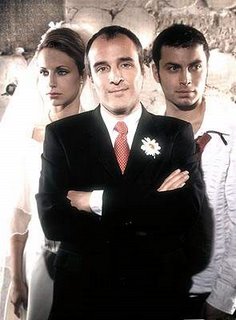 A sus cuarenta años, Daniel es un homosexual de buena familia que disfruta de una desahogada posición social, un cómodo piso en un buen barrio de Madrid, un respetable bufete de abogados y una cordial relación con su conservadores padres, hermanos y cuñados.
A sus cuarenta años, Daniel es un homosexual de buena familia que disfruta de una desahogada posición social, un cómodo piso en un buen barrio de Madrid, un respetable bufete de abogados y una cordial relación con su conservadores padres, hermanos y cuñados.Sin embargo, su vida privada se aleja un poco de tan convencional entorno. En sus ratos libres frecuenta el barrio gay de Madrid con sus habituales amigos, a veces a la cala de chicos guapos, últimamente todos extranjeros y especialmente eslavos, tras el derrumbe del Bloque del Este. Será en una terraza de Chueca en donde conocerá a Kyril, un búlgaro atractivo y sin escrúpulos de 23 años, del que quedará perdidamente enamorado. El perfecto compañero para un imprescindible viaje interior, un encuentro con sus verdaderas necesidades, un alter ego desarraigado y aventurero que además le llevará al borde de perder su seguro y aburguesado status social: los peligrosos y en ocasiones divertidos líos en que éste le va metiendo constituye en el argumento del guión, líos en los que Daniel se adentra diciéndose a si mismo que lo hace por ayudarle a salir adelante, pero en el fondo completamente vendido por la pasión que siente por él. Kyril se deja querer mientras va pidiéndole a su protector todo tipo de favores sospechosamente ilegales.
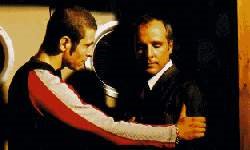
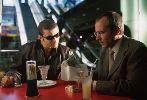 Termina trayéndose de Bulgaria e instalando a su novia Kalina en su casa. Daniel les buscará piso y les acompañará en la fuga precipitada a su país de origen, donde conocerá a la familia de Kyril, que sobrevive como puede entre las ruinas del sistema comunista. Para todos, Daniel es un caballero español, una especie de Quijote contemporáneo, pese a que él es perfectamente consciente de estar siendo utilizado. De vuelta a Madrid, Daniel se ve expuesto a cada vez mayores peligros: avalará con una importante suma de dinero las sospechosas actividades de su amante, le arreglará los papeles de un coche robado y hasta se jugará la vida para sacarle de la cárcel, entregando a las mafias búlgaras una peligrosa mercancía radioactiva.
Termina trayéndose de Bulgaria e instalando a su novia Kalina en su casa. Daniel les buscará piso y les acompañará en la fuga precipitada a su país de origen, donde conocerá a la familia de Kyril, que sobrevive como puede entre las ruinas del sistema comunista. Para todos, Daniel es un caballero español, una especie de Quijote contemporáneo, pese a que él es perfectamente consciente de estar siendo utilizado. De vuelta a Madrid, Daniel se ve expuesto a cada vez mayores peligros: avalará con una importante suma de dinero las sospechosas actividades de su amante, le arreglará los papeles de un coche robado y hasta se jugará la vida para sacarle de la cárcel, entregando a las mafias búlgaras una peligrosa mercancía radioactiva. 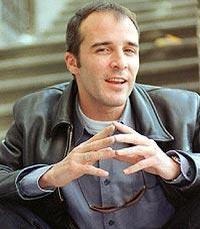
Fernando Guillén Cuervo
Fecha de nacimiento: 11/03/1963.
Lugar de nacimiento: Barcelona, Cataluña (España).
Filmografía como director:
(2000) Año mariano. De Karra Elejalde
Filmografía como actor:
(1975) El adúltero. De Ramón Fernández
(1985) Crimen en familia. De Santiago San Miguel
(1986) Adela. De Carlos Balagué
(1987) La ley del deseo. De Pedro Almodóvar
(1987) La señora. De Jordi Cadena
(1989) El mundo de Juan Lobón. De Enrique Brasó
(1989) El mar y el tiempo. De Fernando Fernán Gómez
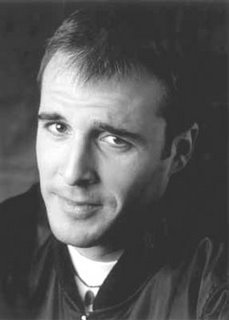
(1990) Boom boom. De Rosa Vergés
(1990) Las edades de Lulú. De J.J. Bigas Luna
(1990) El invierno en Lisboa. De José A. Zorrilla
(1991) La noche más larga. De José Luis García Sánchez
(1991) El laberinto griego. De Rafael Alcázar
(1992) Shooting Elizabeth. De Baz Taylor
(1992) Havanera 1820. De Antonio Verdaguer
(1993) El aliento del diablo. De Paco Lucio
(1994) A Business Affair. De Charlotte Brandstrom
(1994) El día nunca, por la tarde. De Julián Esteban
(1994) Sálvate si puedes. De Joaquín Trincado
(1995) Gran Slalom. De Jaime Chávarri
(1996) Calor... y celos. De Javier Rebollo
(1996) Corsarios del chip. De Rafael Alcázar
(1997) Airbag. De Juanma Bajo Ulloa
(1998) Un buen novio. De Jesús R. Delgado
(2000) Año mariano. De Karra Elejalde
(2001) No te fallaré. De Manuel Ríos San Martín
(2001) Todo menos la chica. De Jesús Delgado
(2002) Nowhere. De Luis Sepúlveda
(2002) El Caballero don Quijote. De Manuel Gutiérrez Aragón
(2002) Los novios búlgaros. De Eloy de la Iglesia
(2003) Amb el 10 a l’esquena. De Eduard Cortés
(2004) Tiovivo c. 1950. De José Luis Garci
(2005) Vorvik. De José Antonio Vitoria
Filmografía como productor:
(2002) Los novios búlgaros. De Eloy de la Iglesia
Filmografía como guionista:
(2000) Año mariano. De Karra Elejalde
(2002) Los novios búlgaros. De Eloy de la Iglesia
